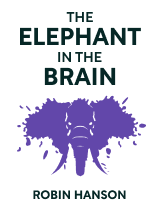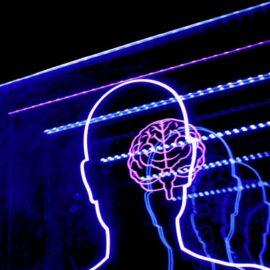

This article is an excerpt from the Shortform book guide to "The Elephant in the Brain" by Robin Hanson and Kevin Simler. Shortform has the world's best summaries and analyses of books you should be reading.
Like this article? Sign up for a free trial here .
Why do we lie about our motives? Why do we seek to deceive others and ourselves about the reasons for our behaviors?
At first glance, the idea of hidden motives may seem convoluted. The answer, according to Kevin Simler and Robin Hanson, is that, as a cooperative social species, we evolved to advance our own interests while appearing as selfless as possible—and it’s easier to deceive others if we’ve already deceived ourselves.
Let’s explore this theory about why we tell lies about our reasons for doing what we do.
Where Hidden Motives Come From
Why do we lie to ourselves and others about our motives? Norms of society evolved as a way to enforce pro-social behaviors such as cooperation, sharing, and non-violence. So, our selfish motivations are at odds with the norms that govern us. But, rather than making humans less inherently selfish, Simler and Hanson say that norms led humans to evolve ways to advance our selfish motivations while appearing to adhere to social standards. In other words, we’ve developed a whole range of strategies for avoiding norm enforcement so that we can get away with “cheating” at our social games. These strategies include:
- Pretexts—we give socially acceptable reasons for doing something that we’re actually doing for selfish reasons. For example, “concern trolling” is the practice of deliberately undermining another person or derailing a discussion under the guise of genuine interest and compassion (such as by criticizing someone’s weight while saying you’re only concerned about their health).
- Discretion—we use code words, subtext, innuendo, body language, and so on to avoid openly stating our intentions. For example, some American conservatives adopted the phrase “Let’s Go Brandon” as a code for “F**k Joe Biden,” allowing them to say something that’s not always acceptable to say in public and to signal in-group membership (because not everyone knows the reference).
- Toeing the line—instead of violating norms outright, we test their boundaries in subtle and plausibly deniable ways. For example, the history of motor racing is full of examples of teams creatively interpreting regulations to gain advantages—such as when some Formula 1 teams installed “water-cooled brake systems” to get around minimum weight rules by jettisoning weight during the race then replacing it before post-race weigh-ins.
Each of these strategies relies on deceiving other people—the idea is that we can act selfishly and competitively while convincing everyone that our motives are pure and we’re obeying social norms. But, according to Simler and Hanson, we often don’t realize we’re using these strategies—because deception is easier to pull off when we believe our own lies, we evolved to deceive others and ourselves simultaneously.
(Shortform note: Again, it’s unclear just how unconscious many of these behaviors are. Authors from Niccolo Macchiavelli to Robert Greene have given advice for manipulating others to achieve your own ends using means that are often quite similar to the ones Simler and Hanson describe. For example, in The 48 Laws of Power, Greene describes tactics such as pretending to be a friend in order to spy on others (in other words, using a pretext) and saying little in order to remain ambiguous (in other words, exercising discretion). Taming the elephant: If we’re aware of these strategies, we can choose to behave more honestly (by following norms or by openly breaking them)—or to improve our deceptions (for example, by implementing Greene’s laws of power.)
Simler and Hanson say that, in order to help us deceive ourselves as well as others, the human brain is made up of a number of self-contained modules, meaning that we can actually hide information (including our true motives) from ourselves. They argue that the brain has a “press secretary” module that’s in charge of explaining our actions to the outside world—and to ourselves.
Like its real-life counterpart, our internal press secretary’s job is to put the best possible spin on whatever we do. Likewise, our internal press secretary tends not to lie outright, but rather to tell selective truths while ignoring less attractive aspects of our behavior. For example, a politician might say he got into politics to serve the public good, which might be true. But what he’d never admit to others—and possibly to himself—is that power and prestige also attracted him to public office. Simler and Hanson argue that this internal spin doctoring is so ingrained that we constantly fool ourselves. They point to studies showing that if we’re tricked into an action or decision we didn’t mean to take—and if we don’t notice the deception—we’ll explain and defend “our” choice without noticing anything wrong.
| The Importance of Internalized Norms Self deception might be, as Simler and Hanson suggest, a strategic advantage when it comes to skirting norms. But there are also reasons to think that self deception serves a more fundamental purpose in allowing us to skirt norms in the first place. According to philosopher Michel Foucault, when rules are enforced through constant observation, we internalize those rules and govern ourselves accordingly. In Discipline and Punish, Foucault argues that modern social systems function like a panopticon—a theoretical prison designed so that prisoners know they might be being watched at any given moment, but can’t verify whether they are or not. In such a prison, Foucault says, inmates adhere to the code of conduct not because they’re overtly forced to but because their perpetual one-sided visibleness conditions them to do so. Recall that, like Foucault’s metaphorical panopticon, our social games make it so that we’re always watching and being watched by others. It seems likely then that a similar internalization happens with norms. If you’re too loud in a library and your fellow patrons angrily shush you, you’ll probably feel shame—and this shame might well be enough for you to regulate your own library volume in the future. Likewise, you probably wouldn’t be openly rude to a colleague you dislike, not just because you fear retribution from the colleague or from your superiors, but also because for many of us it just feels wrong to insult people to their faces in a business setting. Even if our reason for “being a good colleague” is selfish—for example, we don’t want to hurt our chances of advancement—the point is that we enforce the “good colleague” norm all on our own. And, if that’s the case—if we internalize norms to the point that we proactively police our own behavior—then we might in fact need to deceive ourselves not just to help us deceive others, but in order to violate norms in the first place. In other words, when we give a disliked coworker a backhanded compliment instead of an open insult, we’re not just looking for plausible deniability if our coworker gets upset—we’re looking for a way to get our true feelings past the conflict aversion and sense of decorum that serve as gatekeepers to our own actions. |

———End of Preview———
Like what you just read? Read the rest of the world's best book summary and analysis of Robin Hanson and Kevin Simler's "The Elephant in the Brain" at Shortform .
Here's what you'll find in our full The Elephant in the Brain summary :
- How human behavior is driven by selfish motives
- Why your own brain is hiding your intentions from you
- Why the purpose of education is to certify future employees







I thoroughly enjoyed the summary and the awesome content